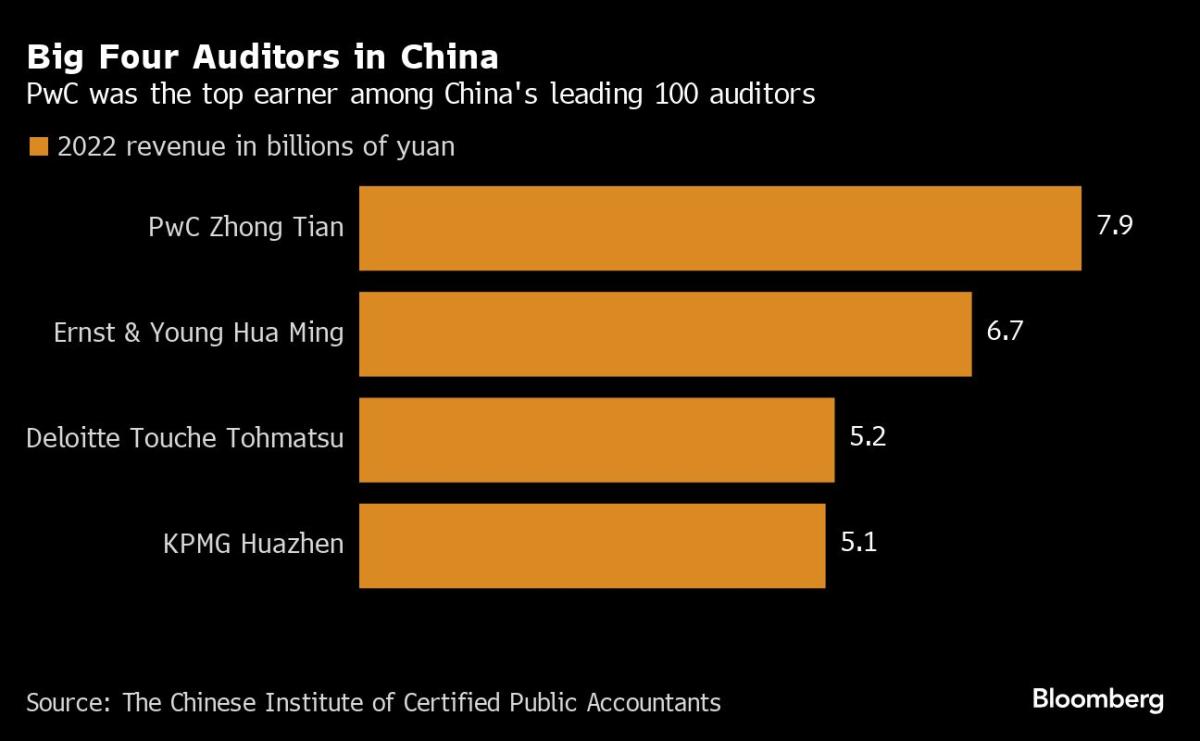


(Bloomberg) — The focus of a lengthy probe into PricewaterhouseCoopers LLP’s China business now shifts to Hong Kong after the accounting firm was hit with a record fine in the mainland over its audit of failed developer China Evergrande Group.
Most Read from Bloomberg
Hong Kong’s Accounting and Financial Reporting Council said its review of PwC’s local practice, which is separate from China’s probe, is still “in progress,” according to a statement Friday. An AFRC spokesperson said the watchdog had no further comment.
The review shows that PwC’s troubles in Greater China are far from over after the firm was fined 441 million yuan ($62 million) and suspended for six months by regulators. Chinese authorities said Evergrande inflated its revenue by 564 billion yuan over two years, in one of the nation’s biggest accounting frauds.
Hong Kong’s accounting regulator can mete out as much as HK$10 million ($1.3 million) in fines if it disciplines PwC. Though it’s based in China, Evergrande is regulated in Hong Kong because its stock traded in the financial hub.
“The severe penalty coming from the mainland will add pressure to Hong Kong regulators,” said Pingyang Gao, an accounting and law professor at HKU Business School. “The Chinese regulator’s characterization of this matter is not only a serious auditing fault, but also to an extent, a collusion with Evergrande.”
PwC China, which covers Hong Kong, audited Evergrande, while its mainland partnership, known as PwC Zhong Tian, worked with Hengda Real Estate Group, Evergrande’s mainland unit.
PwC said it’s taking steps to address the problems, acknowledging that the work on Hengda “fell below our own high standards and the standards our stakeholders rightly expect of us,” according to a statement. “We deeply regret and apologize for the impact this has had on our clients and people.”
The firm also faces a lawsuit in Hong Kong filed by Evergrande’s liquidators as they try to recover creditors’ investments in the failed developer, which defaulted in 2021 as China’s housing crisis began to spiral. The liquidators cited the accounting firm’s “negligence” and “misrepresentation” in the auditing work.
The probes and legal proceedings threaten to hinder business for PwC, which had more revenue in China than any of the Big Four accounting firms as recently as 2022. Several listed companies have already parted ways with the firm, while China has also been instructing its biggest companies to phase out the Big Four auditors over data risks, Bloomberg News reported earlier.
“It is very likely that there will be a mass exodus,” said Gao. “It will likely spell doom for PwC’s business in China.”
PwC said the staff who worked on the audit are no longer with PwC. In other moves, Daniel Li stepped down as the territory senior partner for China, but will continue to support the business as chief accountant of the local unit. Hemione Hudson will take over on an interim basis and relocate to the region.
Hudson is PwC’s global chief risk and regulatory officer and executive chair heading Europe, the Middle East and Africa from London, according to the firm’s website.
In addition to the executive moves, PwC Hong Kong has told clients it’s considering another partnership to carry out future business and segregate new income from potential fines and lawsuits, people familiar with the matter said. The idea remained preliminary, the people said.
Some clients have been consulting other Big Four firms and the regulators to see if they can drop PwC after using them for the first half of the financial year, according to people familiar who asked not to be identified because the discussions were private. Failing to publish financial reports due to a change in auditors can lead to a trading suspension.
When asked if the exchange will grant extension to these companies, an HKEX spokesperson said the bourse expects listed firms “to be fully compliant with the requirements of our Listing Rules.”
Meanwhile, several senior PwC partners in the region advising other industries than developers are considering early retirement to protect themselves from having to share the burden of any potential fines or compensation, people familiar said. The Evergrande case could spark similar actions from other troubled property developer clients and their creditors, the people said.
Audit firms typically pay regulatory fines out of their own reserves because professional indemnity insurance generally doesn’t cover these penalties, said Clement Chan, chairman of the Hong Kong Association of Registered Public Interest Entity Auditors.
Partners can be asked to contribute the rest, based on each firm’s policies, he said. These costs can be higher in Hong Kong since PwC’s partnership there was registered with unlimited liability, whereas China’s was limited.
PwC China had 7.9 billion yuan in revenue in 2022 from about 400 clients from Shanghai to Hong Kong and New York, according to the Chinese Institute of Certified Public Accountants. Asia-Pacific accounted for almost a fifth of global revenue in 2023.
–With assistance from Trista Xinyi Luo.
Most Read from Bloomberg Businessweek
©2024 Bloomberg L.P.